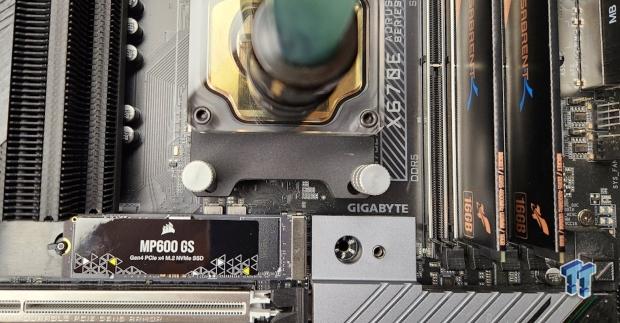The Bottom Line
Pros
- + Single sided
- + Gaming performance
- + High endurance
Cons
- - Current pricing
- - Consumer workloads
Should you buy it?
AvoidConsiderShortlistBuyIntroduction & Drive Details
It's been quite some time since we've had a new Corsair SSD strapped to our test bench. One thing we can be assured of when we get a Corsair SSD in the lab is that SSD will be the result of a collaborative effort with Phison Electronics. Our test subject is the newest addition to Corsair's MP600 GS Series. Corsair's MP600 GS Series are a DRAMless value-oriented line of PCIe Gen4 SSDs. The 2TB model we have on the bench today is powered by Phison's E21T 4-channel DRAMless PCIe Gen4 controller.
The subject of today's review is not the first we've seen of Phison's E21T controller, but it is the first time we've tested this controller in front of a 2TB flash array. We will point out that this SSD is a bit unusual for a Phison-based SSD because it is a preferred single-sided design arrayed with 2TB of Micron B47R. Single-sided and 2TB, physically, our test subject is appealing. How well will Phison's E21T control four 512GB flash packages? We really like what we've seen from similarly configured budget friendly 1TB E21 T-based SSDs we've tested previously, but 2TB may be a different story.
Let's find out.
Drive Details
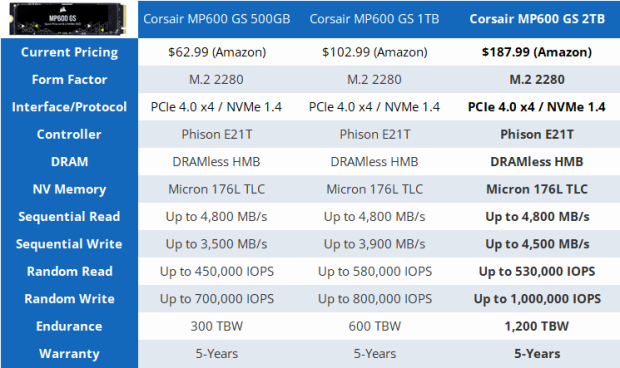
Currently, the 2TB model we have on our bench is retailing for less than 10 cents per gigabyte for premium TLC. Not necessarily a bad price point, considering the drive is arrayed with 2TB TLC, but it is priced similarly to far better-performing SSDs, so we expect to see a price drop coming soon. A TBW of 1,200 is quite good, as is its 5-year warranty.
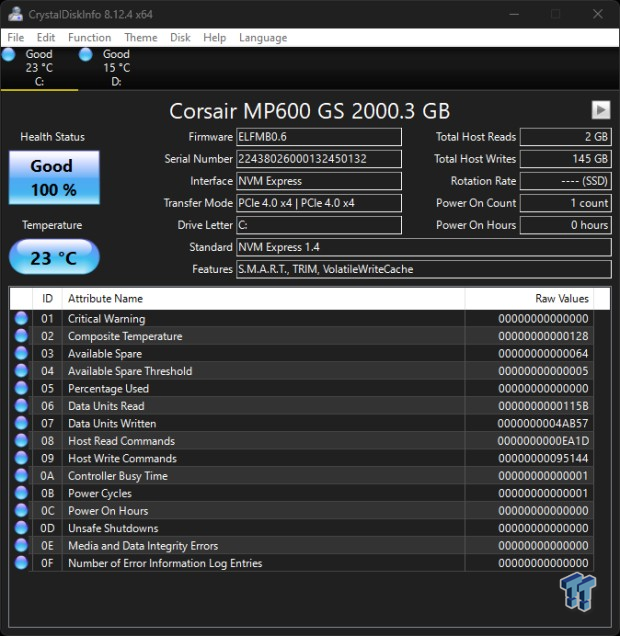
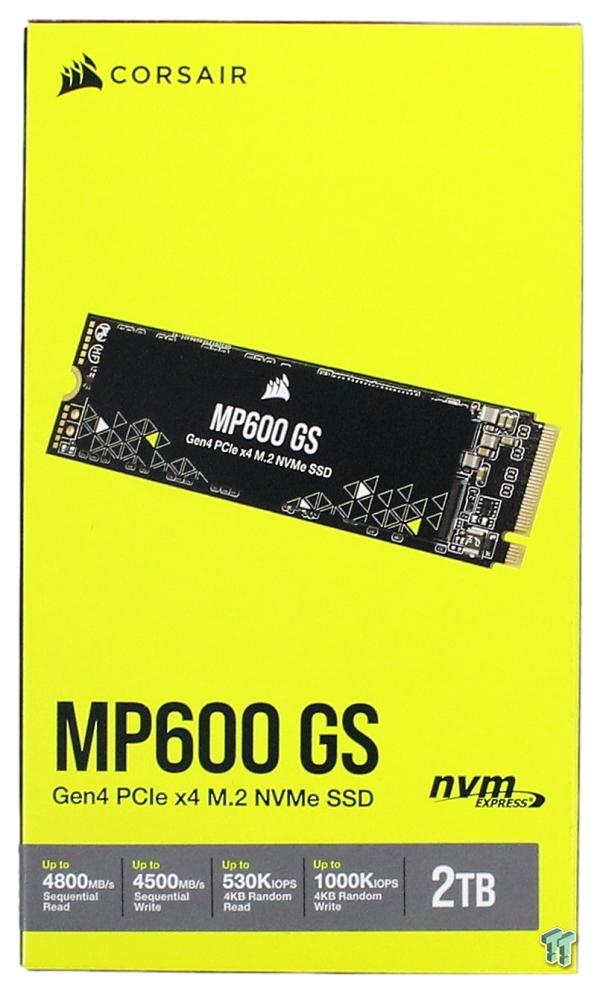
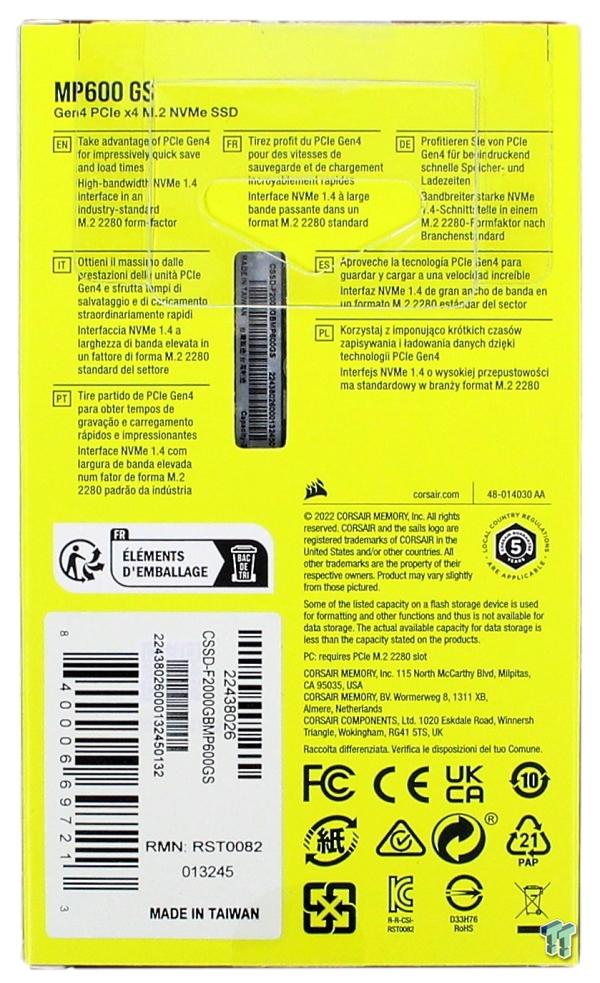


As previously mentioned, our 2TB test subject is a preferred single-sided design, making it fit better and easier to cool than equivalent double-sided designs. Excellent.
As with all Corsair SSDs, the MP600 GS is fully compatible with Corsair's SSD Toolbox.
Jon's Test System Specifications
Intel Test System
- Motherboard: ASUS ROG Z690 HERO
- CPU: Intel Core i9-13900K - Buy from Amazon
- Cooler: Alphacool Eissturm Hurricane Copper 45 - Buy from Amazon
- RAM: Sabrent Rocket DDR5 32GB - Buy from Amazon
- Graphics Card: MSI SUPRIM X RTX 3080 12GB - Buy from Amazon
- Case: PrimoChill's Praxis Wetbench - Buy from Amazon
- Power Supply: be quiet! Dark Power Pro 12 1200W - Buy from Amazon
- OS: Microsoft Windows 11 Pro 64-bit - Buy from Amazon
AMD Test System
- Motherboard: GIGABYTE X670E AORUS Master
- CPU: AMD Ryzen 5 7600X - Buy from Amazon
- Cooler: Alphacool Eissturm Hurricane Copper 45 - Buy from Amazon
- RAM: Sabrent Rocket DDR5 32GB - Buy from Amazon
- Graphics Card: MSI SUPRIM X RTX 3080 12GB - Buy from Amazon
- Case: PrimoChill's Praxis Wetbench - Buy from Amazon
- Power Supply: be quiet! Dark Power Pro 12 1200W - Buy from Amazon
- OS: Microsoft Windows 11 Pro 64-bit - Buy from Amazon
Because we at TweakTown like to be first at everything whenever we can, we are going to present our storage performance results for the test subject on both 13th Gen Intel and 7000 Series AMD platforms going forward for the foreseeable future. Because Intel still delivers the best real-world storage performance, (Look Here), our running chart will continue to be Intel-based until AMD can deliver better real-world storage performance than its rival.

Synthetic Benchmarks: CDM, Anvil, ATTO
CrystalDiskMark
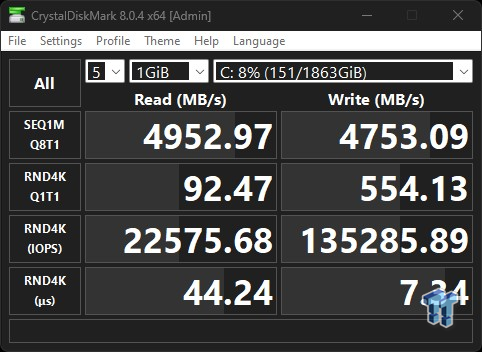
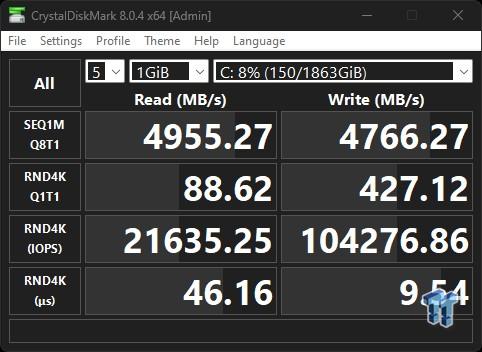
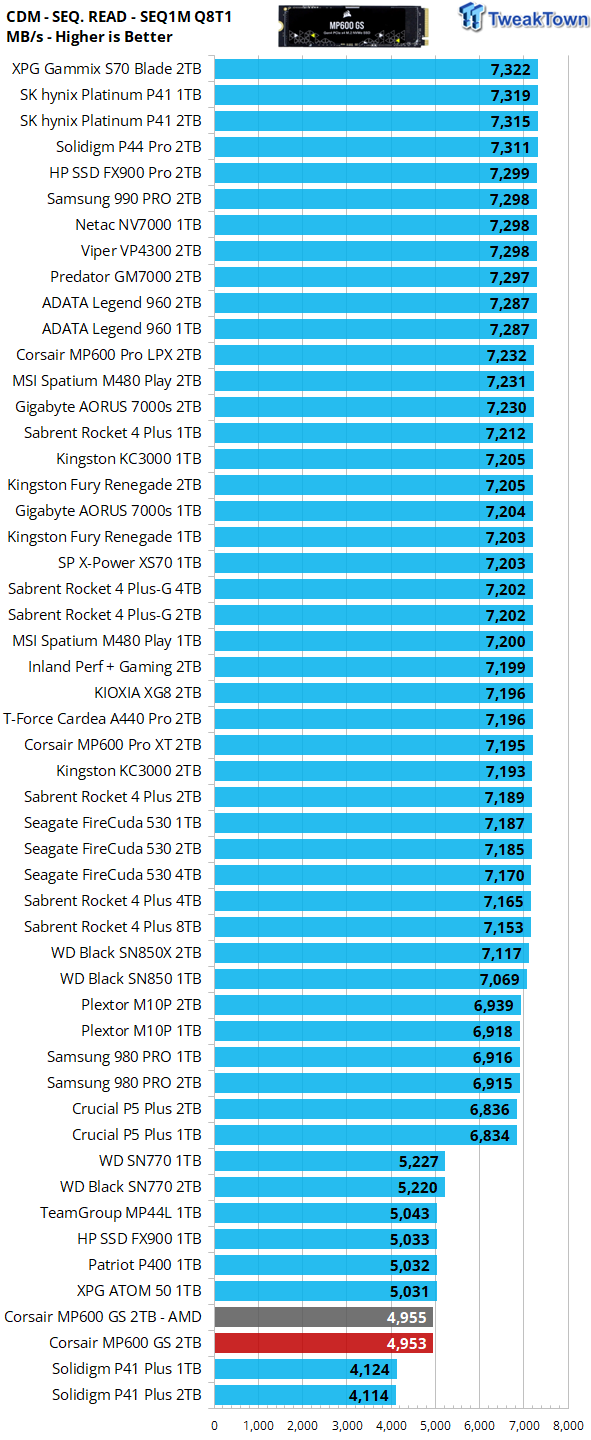
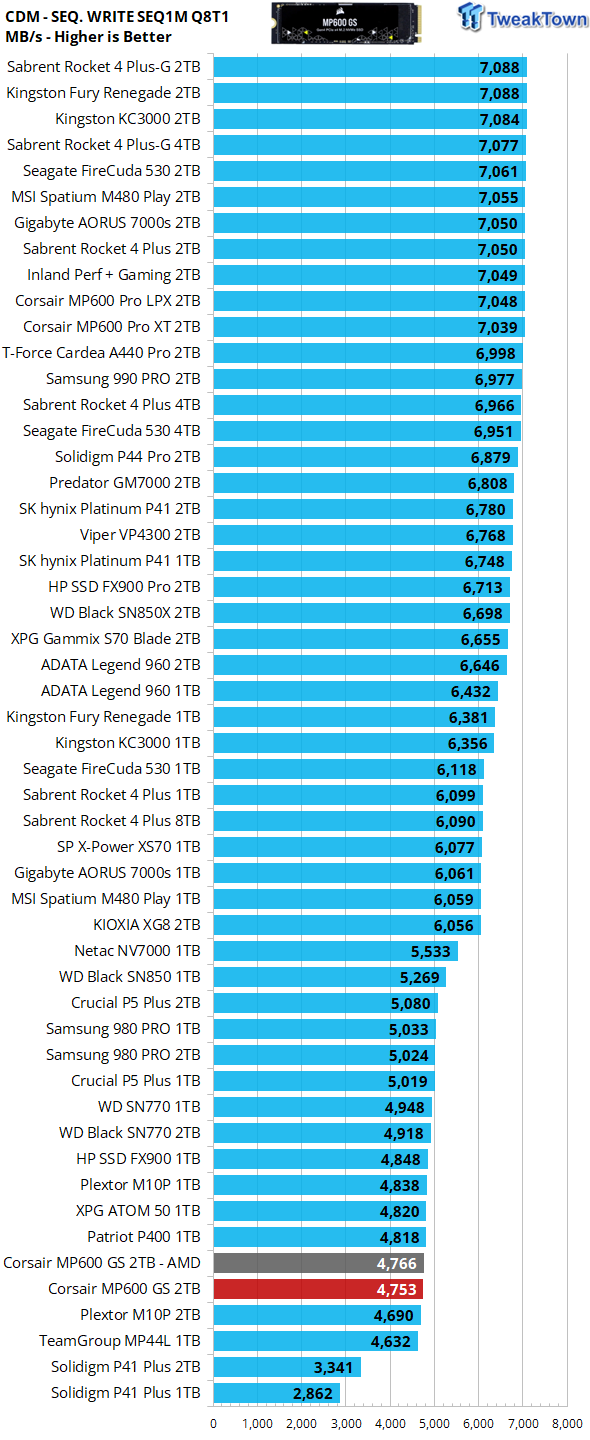
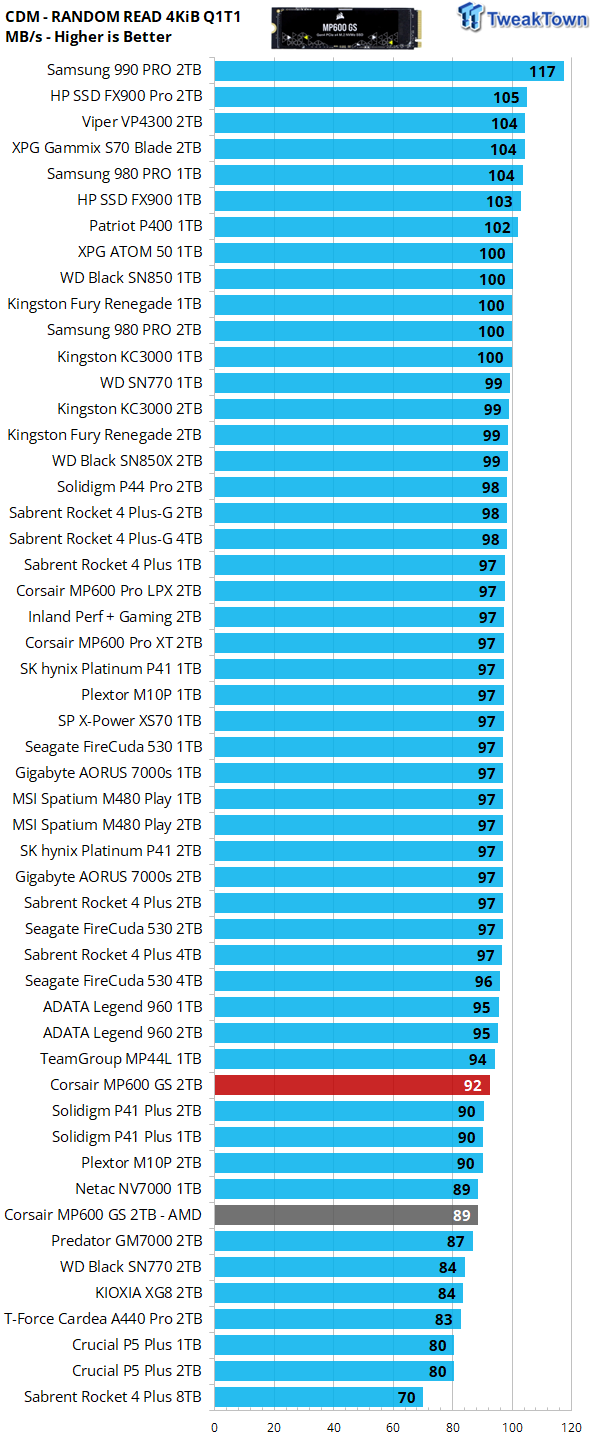
We are seeing better sequential throughput than Corsair specs the drive for, so not bad in that respect. Additionally, the Q1T1 random read is looking decent.
Anvil's Storage Utilities
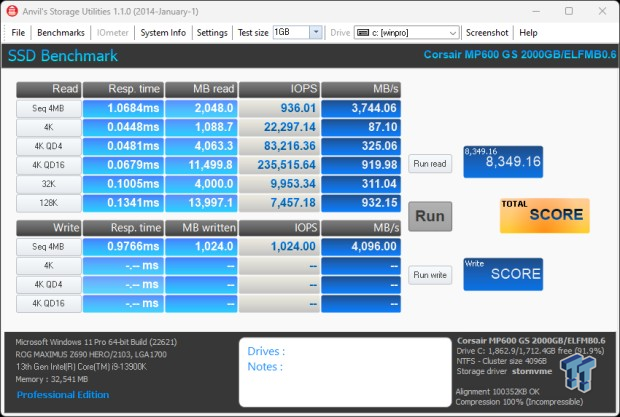
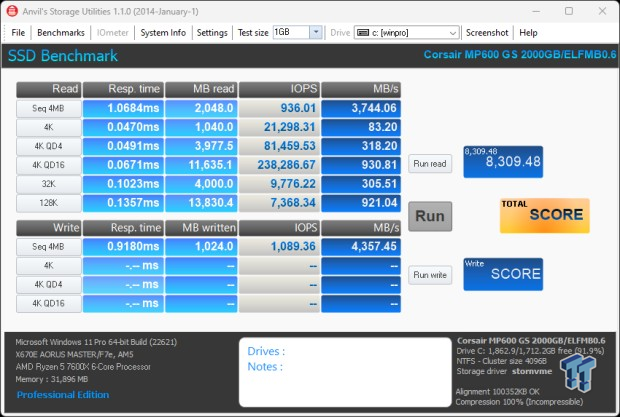
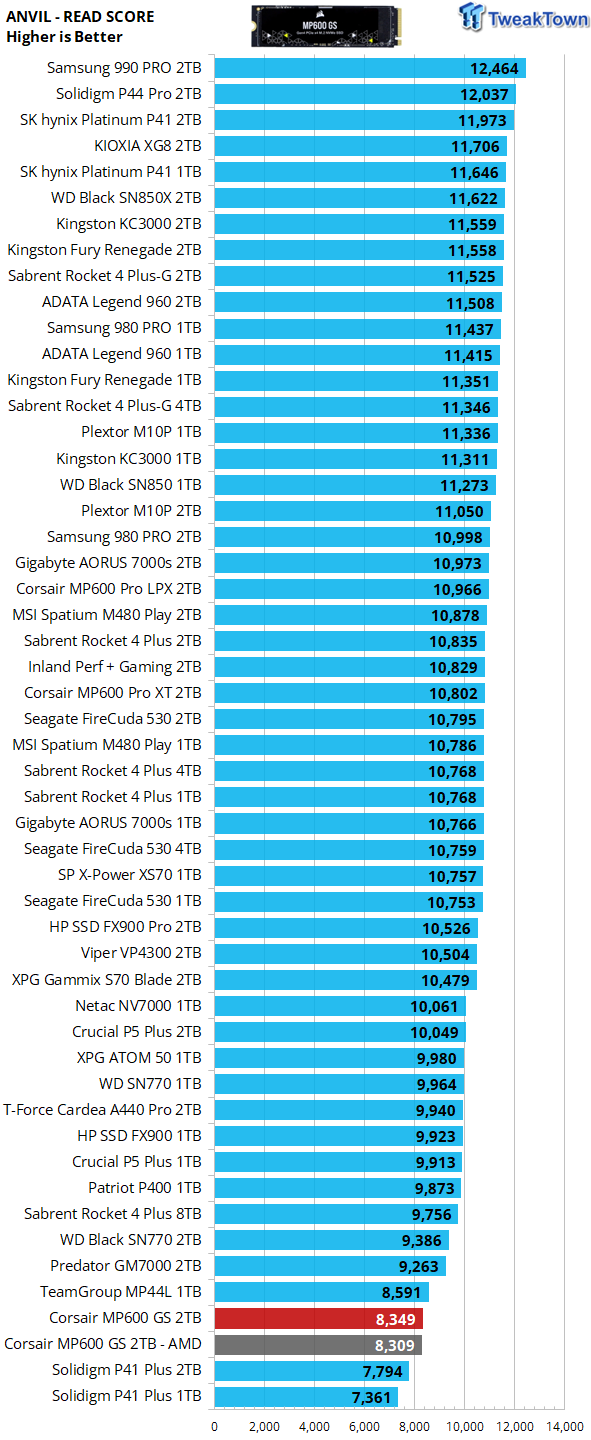
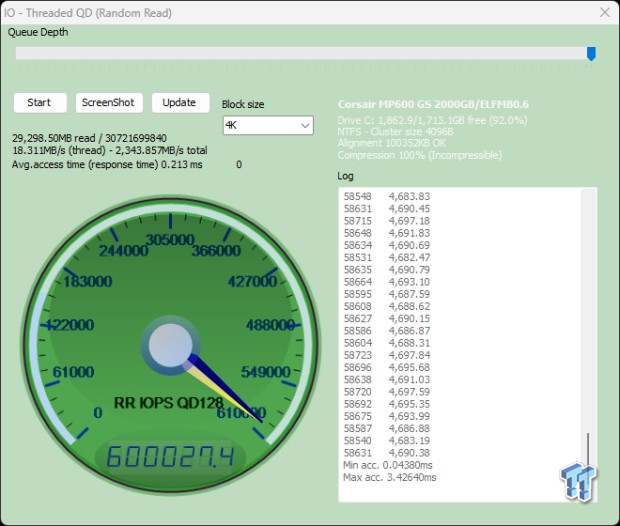
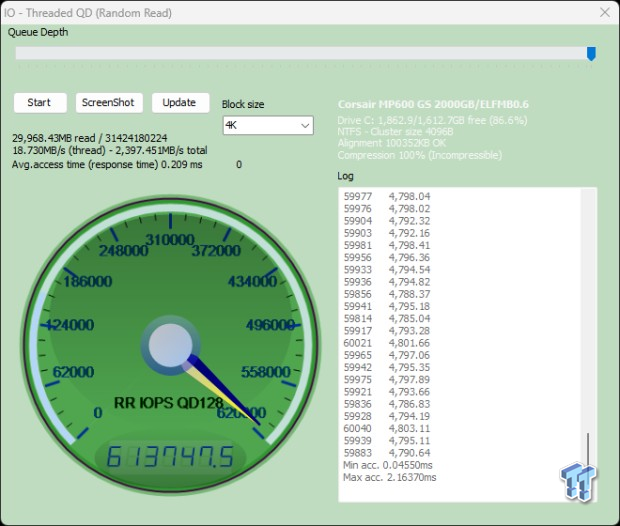
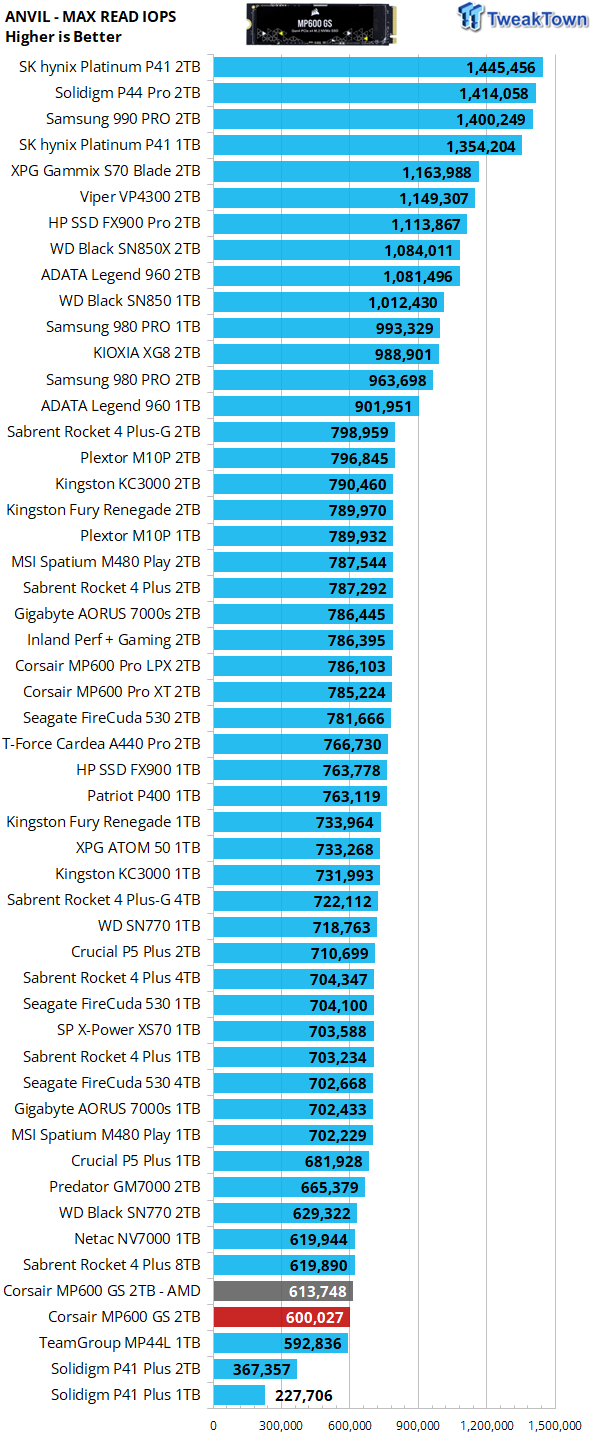
The word lackluster comes to mind here.
ATTO
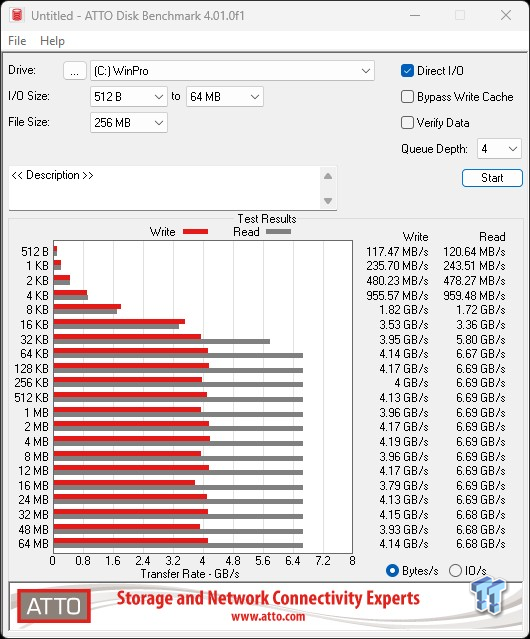
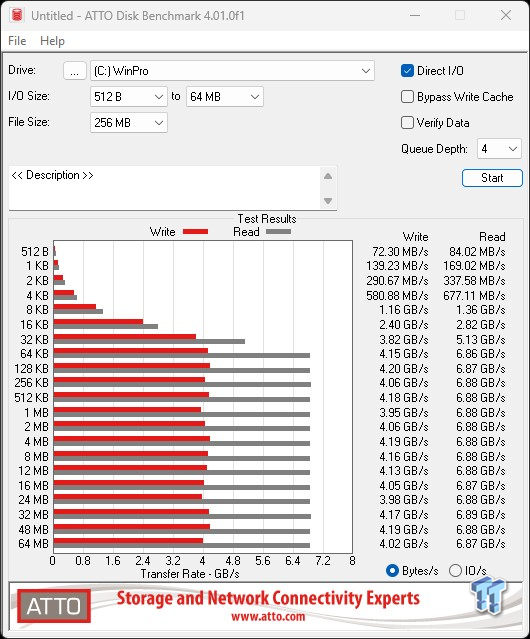
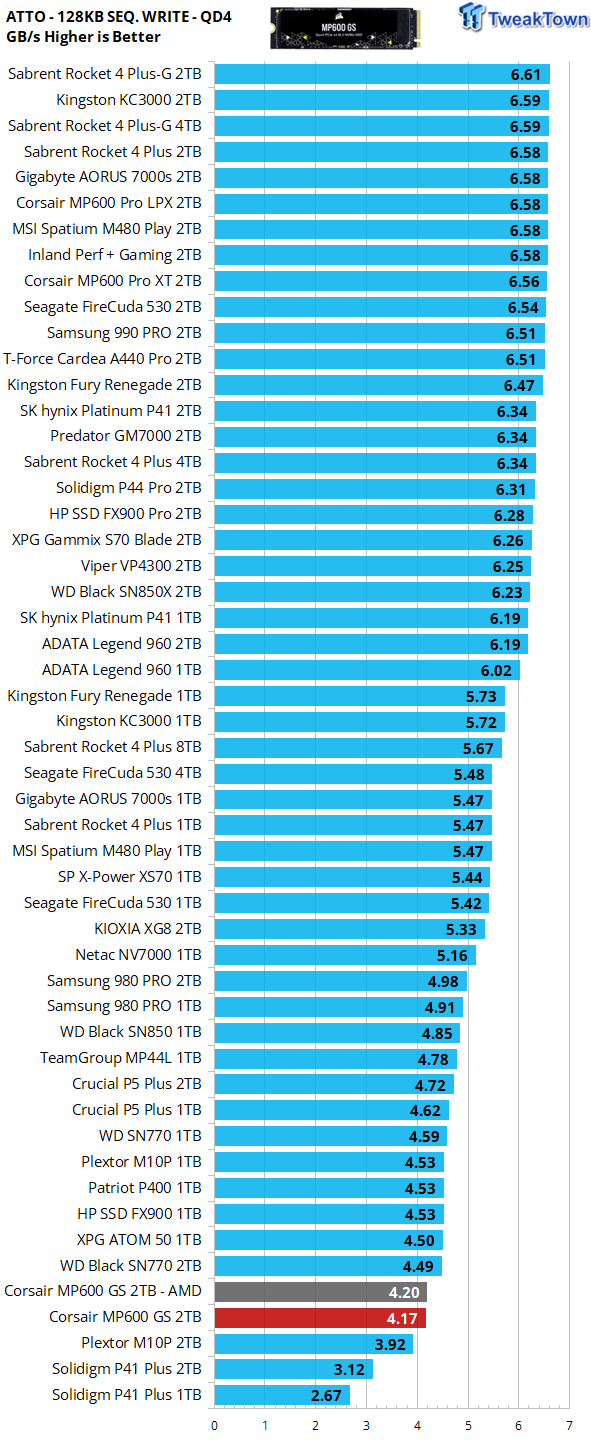
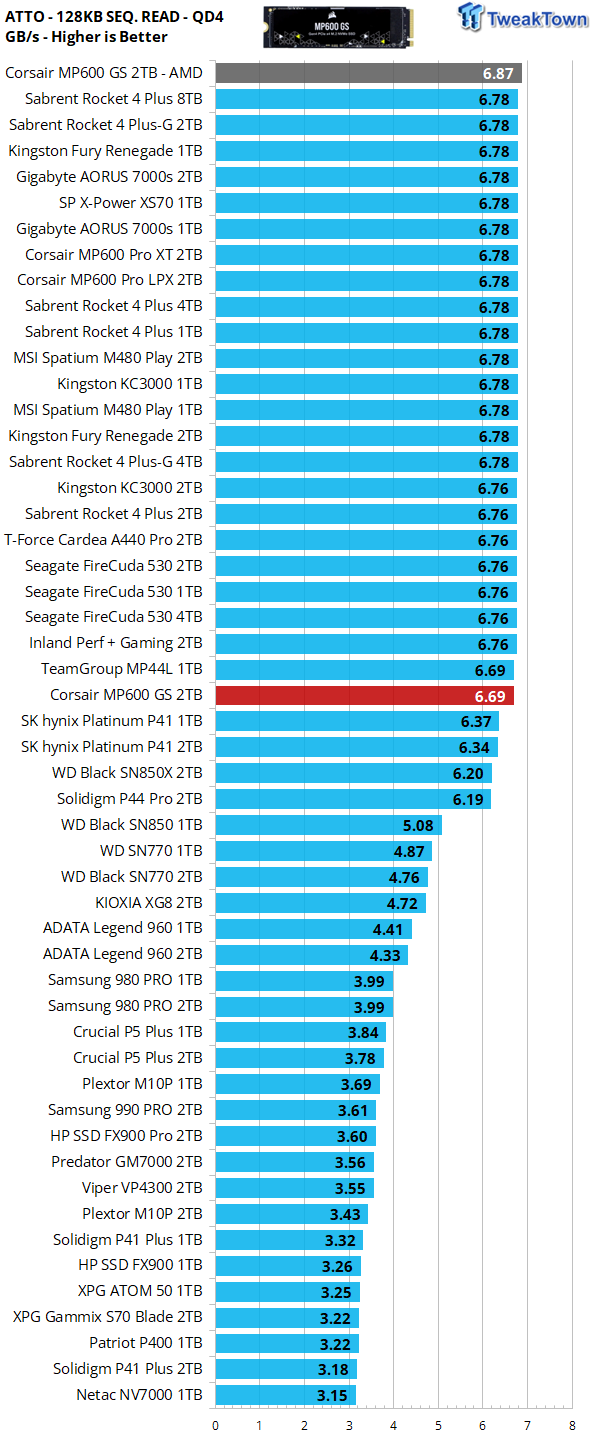
More than anything else, ATTO gives us a clear picture of what transfer sizes a particular SSD favors in terms of sequential throughput. Our test subject, as it is with all Phison Controlled SSDs, delivers its maximum throughput at 128K transfers. Exactly what we want to see.
Real-World Testing: Transfers, 3DMark SSD Gaming Test, PCM10 Storage
Transfer Rates
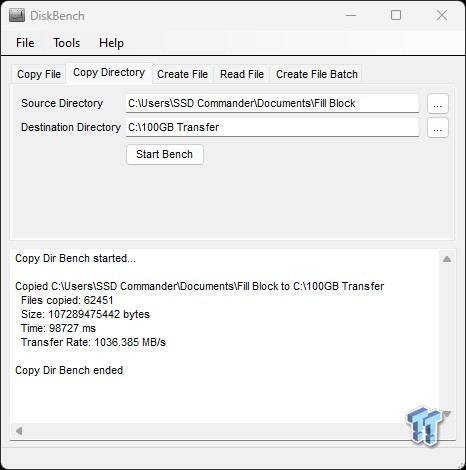
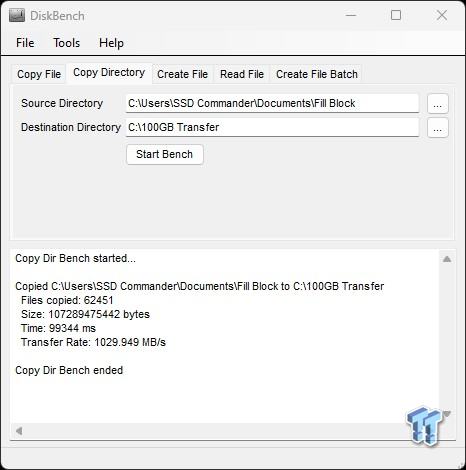
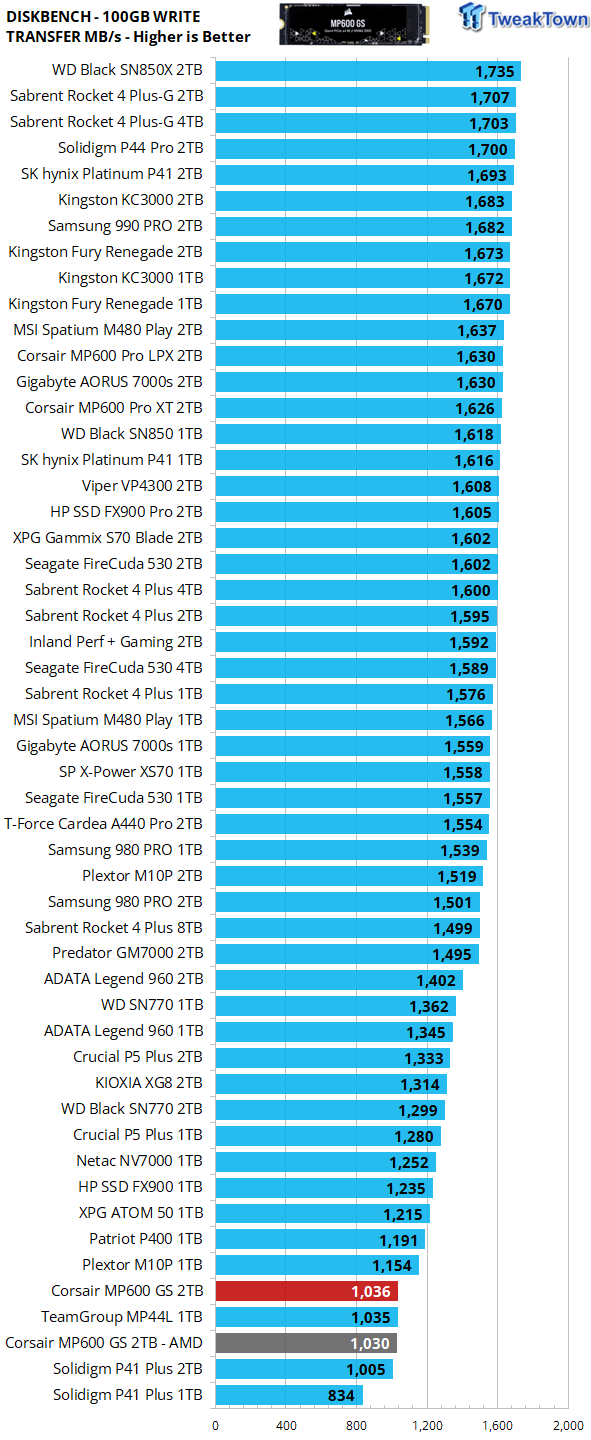
Our 100GB data transfer test is not your ordinary 100GB of data. Ours is a crushing mix composed of more than 62K files. Write performance random or sequential, is an infrequent operation, and as such, we do not consider it to be an important performance metric in the consumer space. An example being how many times is a game installed vs. how many times it's played. Results here are as expected for an E21T-controlled SSD. Good enough, as we see it.
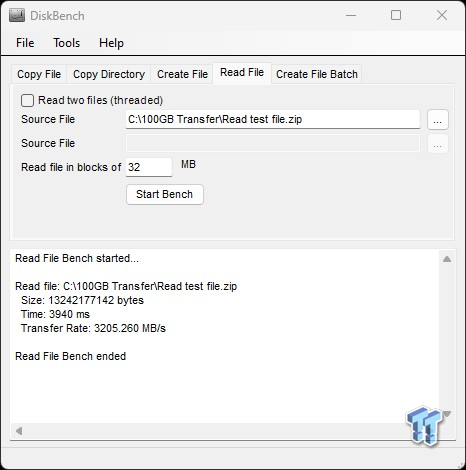
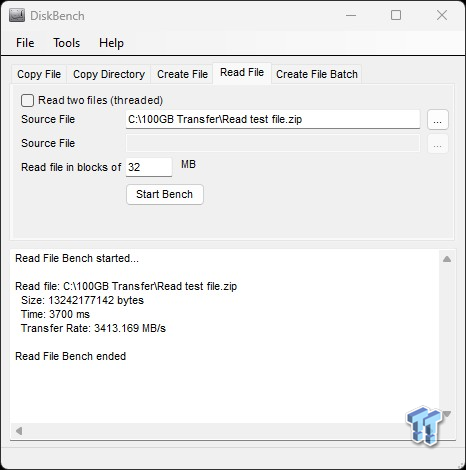
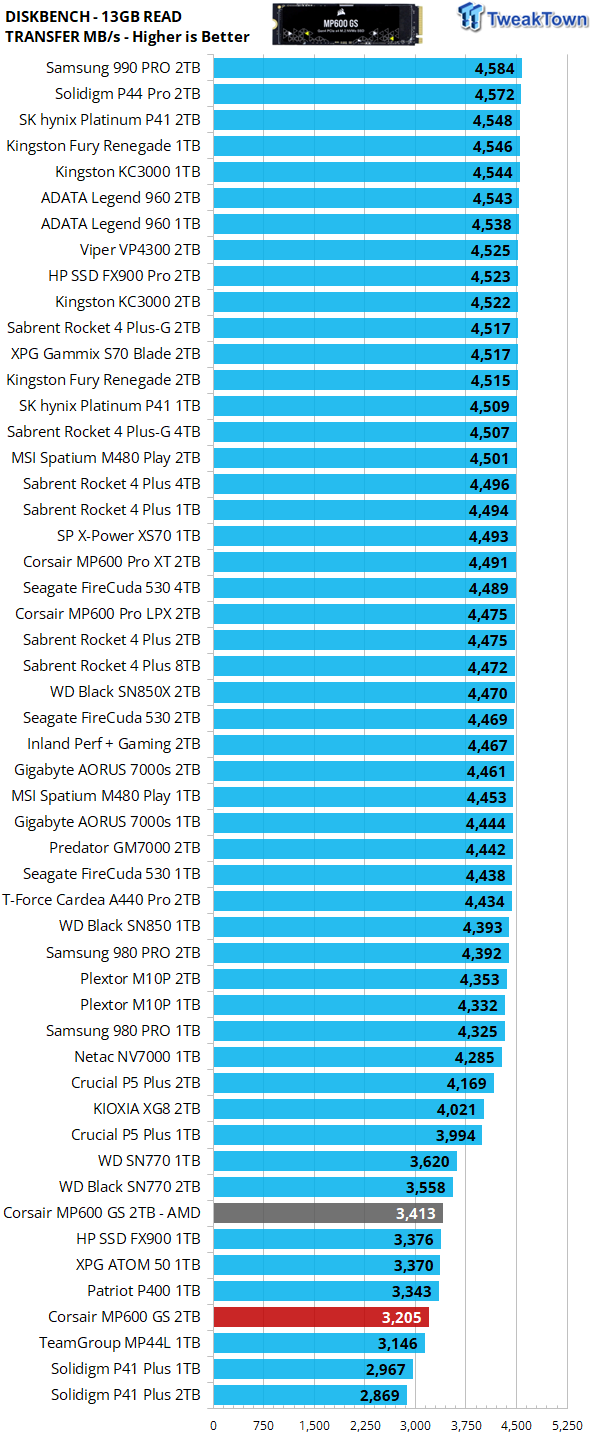
Again, as expected for what it is and again good enough as we see it.
3DMark SSD Gaming Test
UL's newest 3DMark SSD Gaming Test is the most comprehensive SSD gaming test ever devised. We consider it superior to testing against games themselves because, as a trace, it is much more consistent than variations that will occur between runs on the actual game itself. This test is in fact the same as running the actual game, just without the inconsistencies inherent to application testing.
In short, we believe that this is the world's best way to test an SSDs gaming prowess and accurately compare it against competing SSDs. The 3DMark SSD Gaming Test measures and scores the following:
- Loading Battlefield V from launch to the main menu.
- Loading Call of Duty Black Ops 4 from launch to the main menu.
- Loading Overwatch from launch to the main menu.
- Recording a 1080p gameplay video at 60 FPS with OBS (Open Broadcaster Software) while playing Overwatch.
- Installing The Outer Worlds from the Epic Games Launcher.
- Saving game progress in The Outer Worlds.
- Copying the Steam folder for Counter-Strike Global Offensive from an external SSD to the system drive.
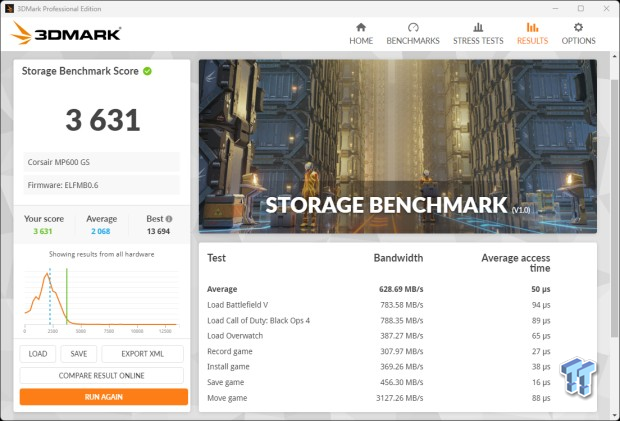
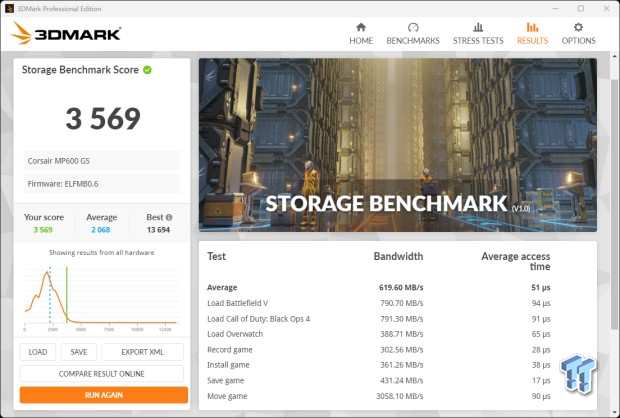
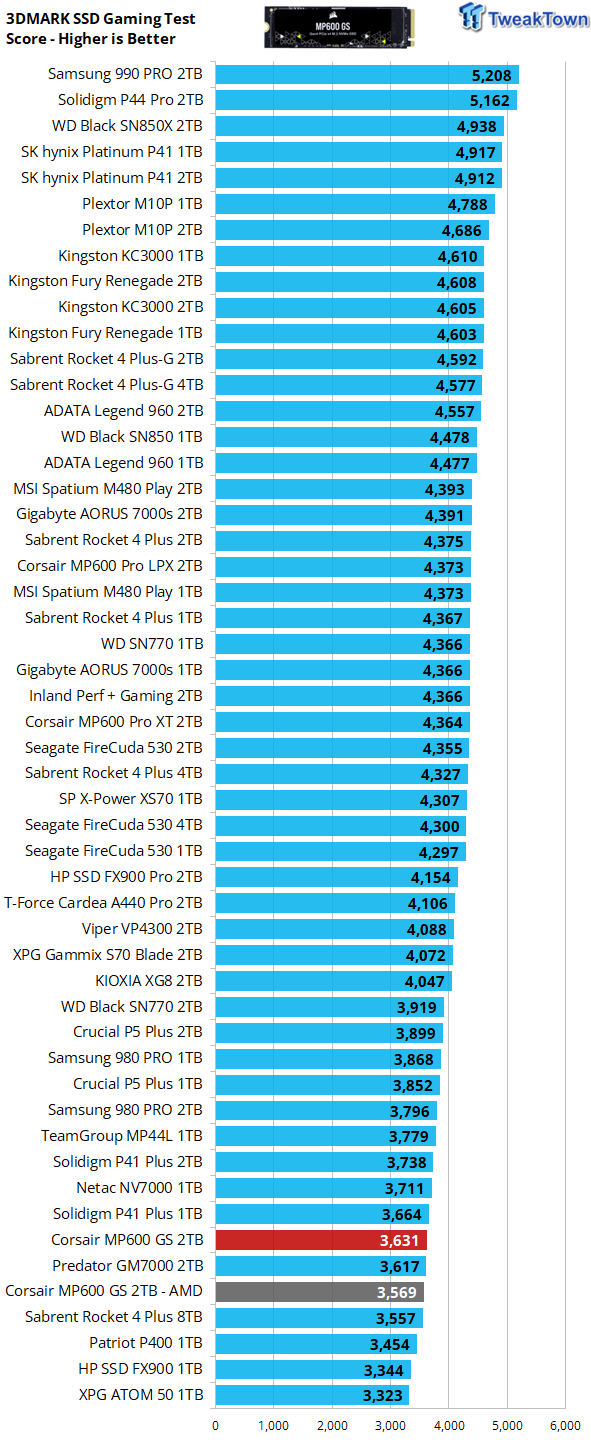
Gaming is a performance metric that matters to the majority of DIY consumers, especially to the enthusiast crowd that TweakTown caters to. The results here are very good for what the drive is. As we see it, the MP600 GS needs to do better than its direct competitors, the IG5220 controlled SSDs, and in this respect, our test subject delivers the goods. Nice.
PCM10 Storage Tests
PCMark 10 Storage Test is the most advanced and most accurate real-world consumer storage test ever made. There are four different tests you can choose from; we run two of them.
The Full System Drive Benchmark and the Quick System Drive Benchmark. The Full System Drive Benchmark writes 204 GB of data over the duration of the test. The Quick System Drive Benchmark writes 23 GB of data over the duration of the test. These tests directly correlate with mainstream user experience.
PCMark 10 Full System Drive Benchmark
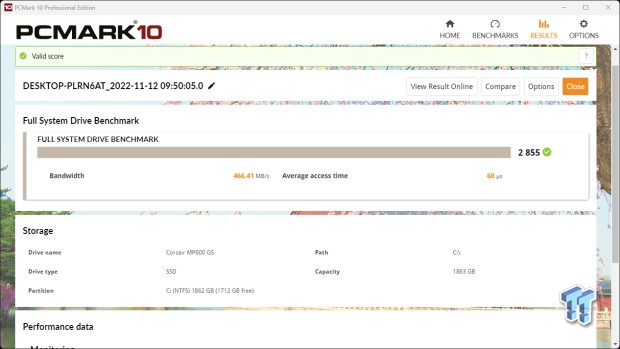
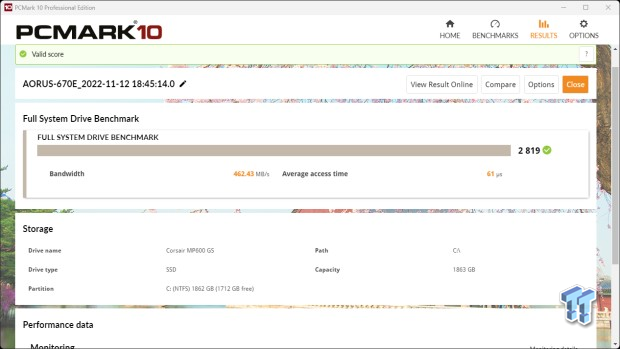
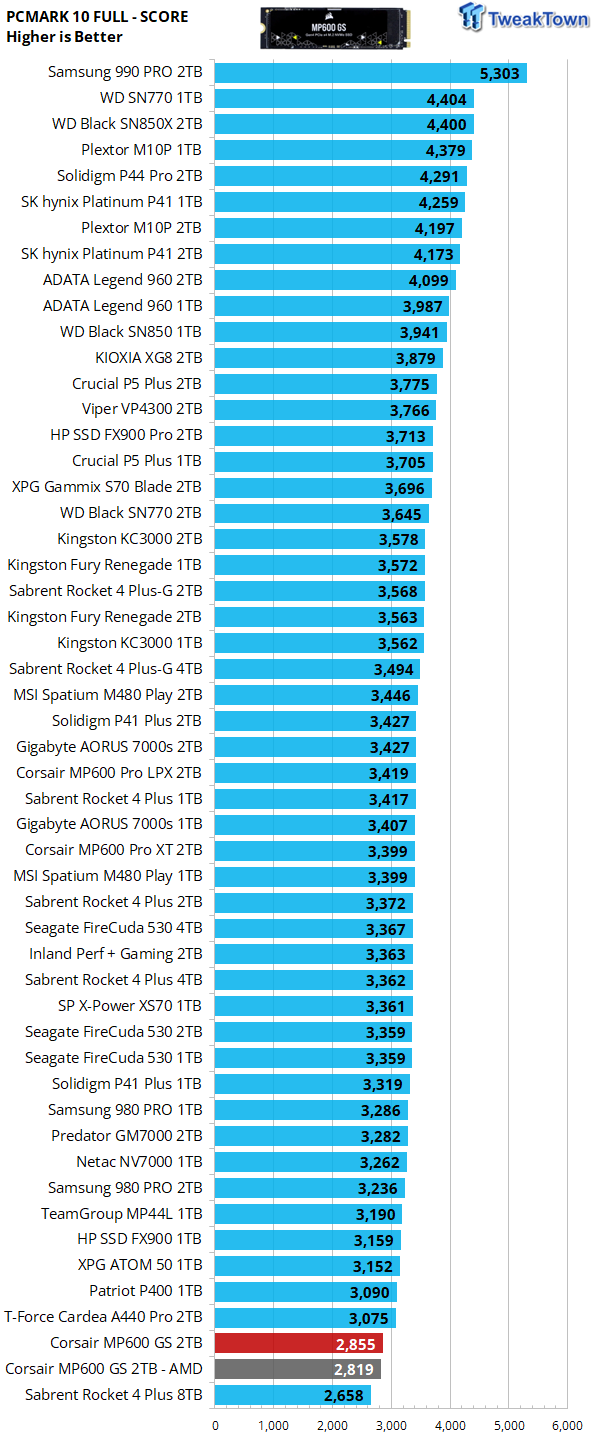
This particular test writes 204GB data and covers a broad range of common consumer tasks, including booting Windows 10, file transfers, Adobe and Office applications, and startup times for games, including Battlefield V, COD Black Ops 4, and Overwatch. Unlike synthetic numbers, this is comprehensive real-world data which is why we use it to rank SSDs in terms of user experience.
Our test subject returns another lackluster score. We could live with it if the price were right, but as of now, the cost cannot justify the performance.
PCMark 10 Quick System Drive Benchmark
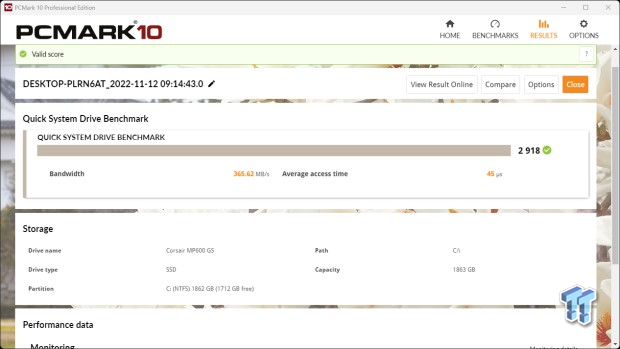
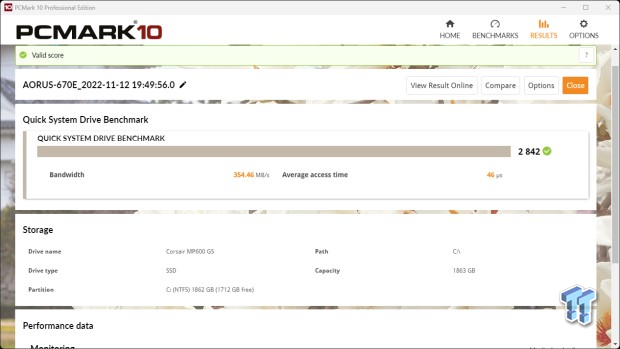
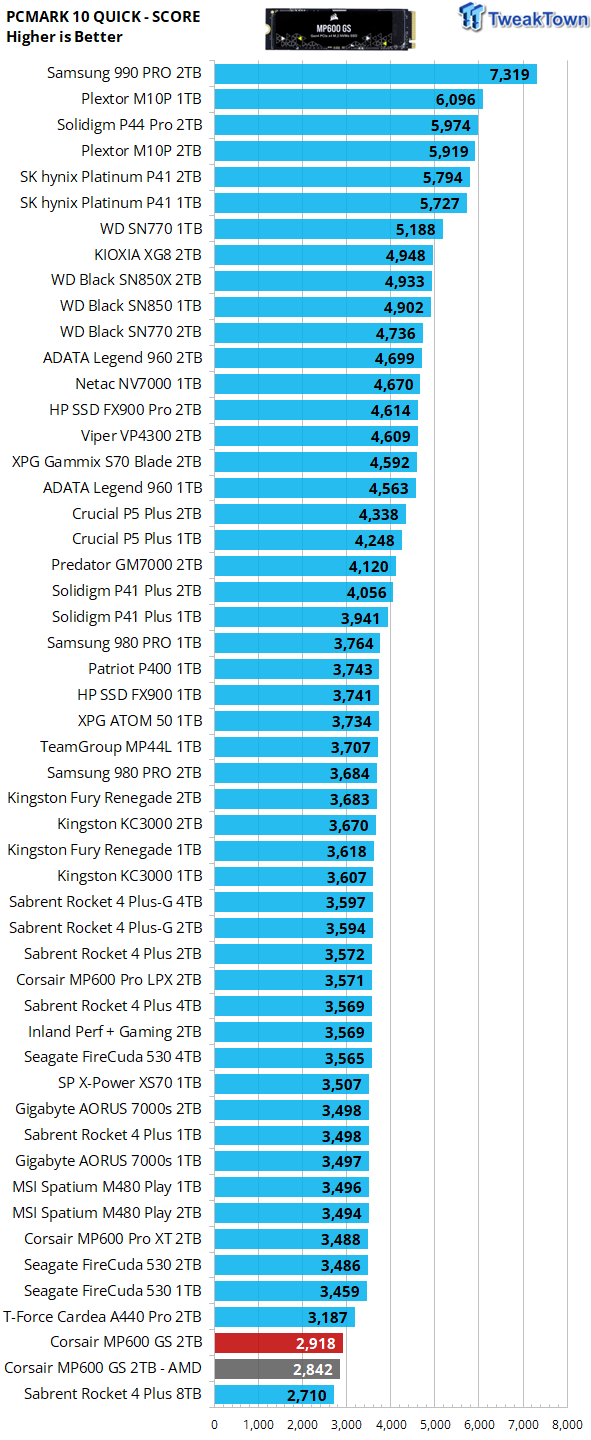
Based on the other E21T controlled SSD that appears on our chart, the MP44L, we had high hopes our test subject would make a comeback of sorts here. Nope.
Final Thoughts
Corsair's MP600 GS 2TB is a low-power, single-sided, DRAMless SSD that would make for a nice laptop upgrade based on its physical characteristics.
However, competition here is fierce, and when we directly compare our test subject first in terms of performance to direct competitors like the WD Black SN770 2TB or Solidigm's P41 Plus 2TB, it's not looking good. When we examine the value proposition our test subject poses, it gets even worse.
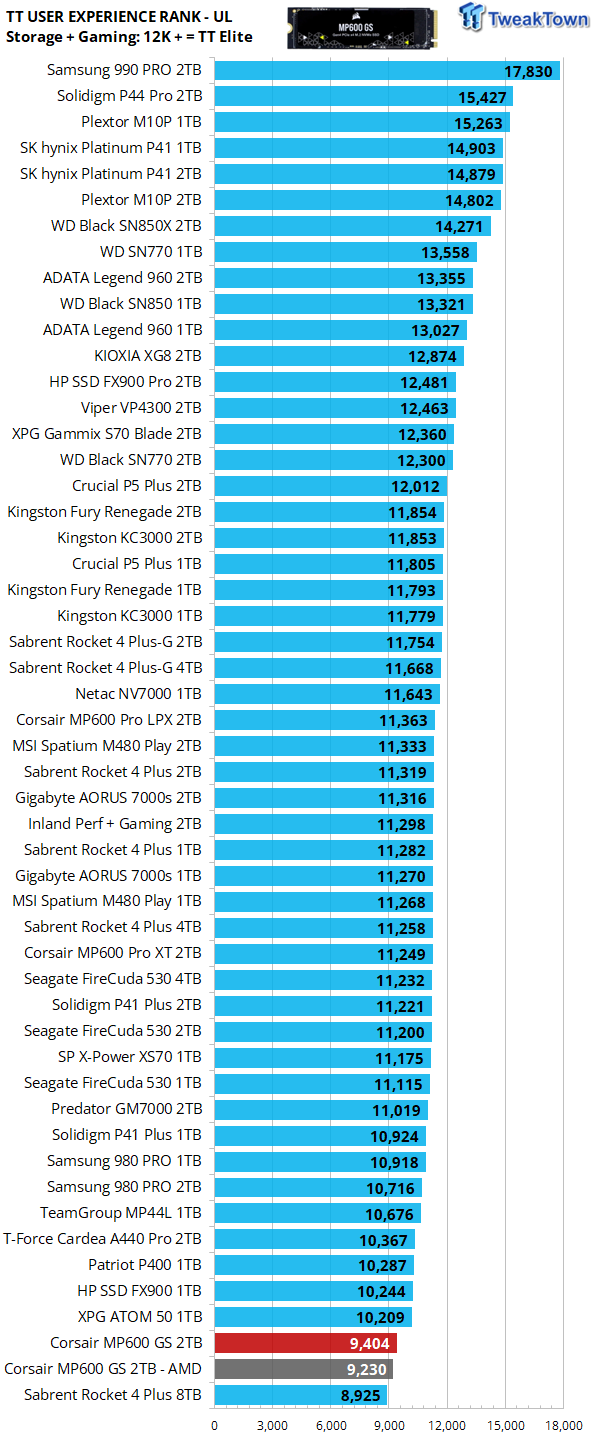
We rank SSDs in terms of overall user experience (performance where it matters most) as expressed by PCMark 10 storage and 3DMark gaming storage tests. We consider a user experience score of 12K or more to verify an SSD as a TweakTown Elite performer. Here's the deal. Is a score of 9K here a deal breaker? Not necessarily. However, there needs to be a redeeming quality, such as exceptional capacity or pricing. Our test subject, as currently priced, has neither of these redeeming qualities, which could offset its inferior performance.
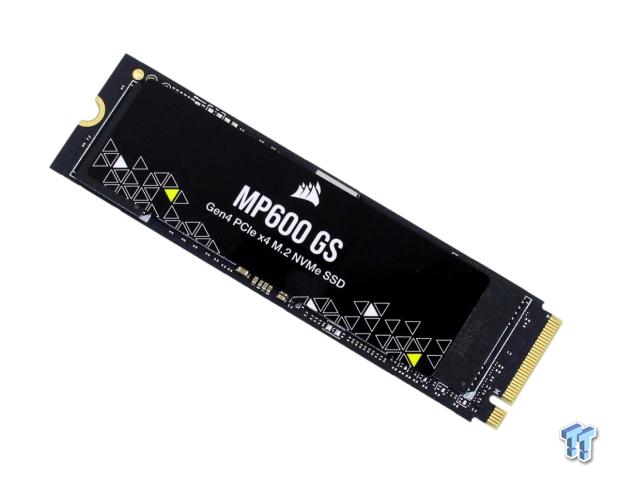
As it stands currently, we cannot recommend the MP600 GS 2TB. We like its physical design being a single-sided 2TB offering, but again it's certainly not unique in this respect. There are plenty of others. TBW is very good, but TBW is mostly a non-factor in the consumer space, so there are no points for that.
Simply stated, it's a hard nope at its current price point. Based on its performance, we would need to see a price point of $129.99 before recommending this drive.

